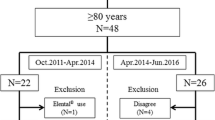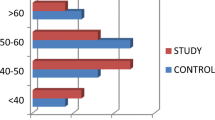Abstract
Background
Perioperative malnutrition is common in patients undergoing esophagectomy, and nutritional support is critical for postoperative recovery in these patients. But few studies reported which characteristics of these patients were associated with post-esophagectomy inadequate calorie intake. This study aimed to explore which patients were more likely to have inadequate calories immediately after esophagectomy and the impact on clinical outcomes.
Methods
From January 2018 to June 2019, patients undergoing esophagectomy were retrospectively divided into the “adequate calorie group” and the “inadequate calorie group” according to whether they met daily calorie requirements in a week after esophagectomy. Caloric requirements met rate and clinical outcomes were compared between patients with and without complications, and with weight > 70 kg or ≤ 70 kg.
Results
Patients in the inadequate calorie group (n = 104) had significantly higher weight (p < 0.001), lean body mass (p = 0.028), and BMI (p = 0.001) than the adequate calorie group (n = 46). Weight loss after esophagectomy was reduced (p = 0.043) in the adequate calorie group. Patients with complications had lower rate of adequate calorie intake (72.8% vs. 63.8%). The caloric requirements met rate in patients with weigh ≤ 70 kg was significantly higher than those weight > 70 kg (80.2% vs. 43.2%, p < 0.001).
Conclusion
The weights of patients having inadequate calories in a week after esophagectomy were significantly heavier than those having adequate calories. Heavier patients after esophagectomy should attract more attention to their nutrition support.
Trial registration
This trial was registered (ChiCTR1900025557).

Similar content being viewed by others
References
Richman DM, Tirumani SH, Hornick JL, Fuchs CS, Howard S, Krajewski K, Ramaiya N, Rosenthal M (2017) Beyond gastric adenocarcinoma: multimodality assessment of common and uncommon gastric neoplasms. Abdom Radiol (NY) 42:124–140
Cohen DJ, Leichman L (2015) Controversies in the treatment of local and locally advanced gastric and esophageal cancers. J Clin Oncol 33:1754–1759
Baker M, Halliday V, Williams RN, Bowrey DJ (2016) A systematic review of the nutritional consequences of esophagectomy. Clin Nutr 35(5):987–994
Martin L, Lagergren J, Lindblad M, Rouvelas I, Lagergren P (2007) Malnutrition after oesophageal cancer surgery in Sweden. Br J Surg 94(12):1496–1500
Nakamura M, Hosoya Y, Umeshita K, Yano M, Doki Y, Miyashiro I, Dannoue H, Mori M, Kishi K, Lefor AT (2011) Postoperative quality of life: development and validation of the “Dysfunction after Upper Gastrointestinal Surgery” scoring system. J Am Coll Surg 213(4):508–514
Brown JC, Meyerhardt JA (2016) Obesity and energy balance in GI cancer. J Clin Oncol 34(35):4217–4224
Chen LK, Liu LK, Woo J, Assantachai P, Auyeung TW, Bahyah KS, Chou MY, Chen LY, Hsu PS, Krairit O, Lee JSW, Lee WJ, Lee Y, Liang CK, Limpawattana P, Lin CS, Peng LN, Satake S, Suzuki T, Won CW, Wu CH, Wu SN, Zhang T, Zeng P, Akishita M, Arai H (2014) Sarcopenia in Asia: consensus report of the Asian Working Group for Sarcopenia. J Am Med Dir Assoc 15(2):95–101
Arends J, Bachmann P, Baracos V, Barthelemy N, Bertz H, Bozzetti F, Fearon K, Hütterer E, Isenring E, Kaasa S, Krznaric Z, Laird B, Larsson M, Laviano A, Mühlebach S, Muscaritoli M, Oldervoll L, Ravasco P, Solheim T, Strasser F, de van der Schueren M, Preiser JC (2017) ESPEN guidelines on nutrition in cancer patients. Clin Nutr 36(1):11–48
Okada G, Momoki C, Habu D, Kambara C, Fujii T, Matsuda Y et al (2019) Effect of postoperative oral intake on prognosis for esophageal cancer. Nutrients 11(6)
Mariette C, De Botton ML, Piessen G (2012) Surgery in esophageal and gastric cancer patients: what is the role for nutrition support in your daily practice? Ann Surg Oncol 19(7):2128–2134
Gillis C, Carli F (2015) Promoting perioperative metabolic and nutritional care. Anesthesiology. 123(6):1455–1472
Boshier PR, Heneghan R, Markar SR, Baracos VE, Low DE (2018) Assessment of body composition and sarcopenia in patients with esophageal cancer: a systematic review and meta-analysis. Dis Esophagus 1:31(8)
Elliott JA, Doyle SL, Murphy CF et al (2017) Sarcopenia: prevalence, and impact on operative and oncologic outcomes in the multimodal management of locally advanced esophageal cancer. Ann Surg 11:266(5)
Smalley SR, Benedetti JK, Haller DG, Hundahl SA, Estes NC, Ajani JA, Gunderson LL, Goldman B, Martenson JA, Jessup JM, Stemmermann GN, Blanke CD, Macdonald JS (2012) Updated analysis of SWOG-directed intergroup study 0116: a phase III trial of adjuvant radiochemotherapy versus observation after curative gastric cancer resection. J Clin Oncol 30(19):2327–2333
Steenhagen E, van Vulpen JK, van Hillegersberg R, May AM, Siersema PD (2017) Nutrition in peri-operative esophageal cancer management. Expert Rev Gastroenterol Hepatol 11(7):663–672
Weimann A, Braga M, Carli F, Higashiguchi T, Hübner M, Klek S, Laviano A, Ljungqvist O, Lobo DN, Martindale R, Waitzberg DL, Bischoff SC, Singer P (2017) ESPEN guideline: clinical nutrition in surgery. Clin Nutr 36(3):623–650
Singer P, Anbar R, Cohen J, Shapiro H, Shalita-Chesner M, Lev S, Grozovski E, Theilla M, Frishman S, Madar Z (2011) The tight calorie control study (TICACOS): a prospective, randomized, controlled pilot study of nutritional support in critically ill patients. Intensive Care Med 37:601–609
Heidegger CP, Berger MM, Graf S, Zingg W, Darmon P, Costanza MC, Thibault R, Pichard C (2013) Optimisation of energy provision with supplemental parenteral nutrition in critically ill patients: a randomized controlled clinical trial. Lancet. 381:385–393
Wu W, Zhong M, Zhu DM, Song JQ, Huang JF, Wang Q, Tan LJ (2017) Effect of early full-calorie nutrition support following esophagectomy: a randomized controlled trial. JPEN J Parenter Enteral Nutr 41(7):1146–1154
Liu K, Ji S, Xu Y, Diao Q, Shao C, Luo J et al (2020) Safety, feasibility, and effect of an enhanced nutritional support pathway including extended preoperative and home enteral nutrition in patients undergoing enhanced recovery after esophagectomy: a pilot randomized clinical trial. Dis Esophagus 33(2)
Thiessen SE, Gunst J, Van den Berghe G (2018) Role of glucagon in protein catabolism. Curr Opin Crit Care 24(4):228–234
Kibbe MR (2018) Reporting of sex as a variable in research published in surgical journals. JAMA Surg. 153(11):983
Mansukhani NA, Yoon DY, Teter KA, Stubbs VC, Helenowski IB, Woodruff TK, Kibbe MR (2016) Determining if sex bias exists in human surgical clinical research. JAMA Surg 151(11):1022–1030
Ling CH, de Craen AJ, Slagboom PE et al (2011) Accuracy of direct segmental multi-frequency bioimpedance analysis in the assessment of total body and segmental body composition in middle-aged adult population. Clin Nutr:30(5)
Buckinx F, Landi F, Cesari M et al (2018) Pitfalls in the measurement of muscle mass: a need for a reference standard. J Cachexia Sarcopenia Muscle 04:9(2)
Mijnarends DM, Meijers JM, Halfens RJ et al (2013) Validity and reliability of tools to measure muscle mass, strength, and physical performance in community-dwelling older people: a systematic review. J Am Med Dir Assoc 14(3)
Acknowledgments
We thank Feng Jiang, Jianfeng Huang, Zhi Zhang, Hui Jia, and Xiaojun Wang for providing clinical cases in this study.
Funding
This research was financially supported by the National Natural Science Foundation of China (No.81672869), Jiangsu Provincial Science Foundation (BK20161596), Jiangsu Provincial Medical Youth Talent (QNRC2016657), Jiangsu Provincial Key Research Development Program (BE2017759), and AOSAIKANG Clinical Pharmacy Foundation of Jiangsu Pharmaceutical Association (A201806).
Author information
Authors and Affiliations
Contributions
Study conception and design: Kaichao Liu, Saisai Sun, Xiaolin Liu, Qin Zhang, Jun Bao, and Binhui Ren. Acquisition of data: Xiaolin Liu, Saisai Sun, Xiang Gao, and Zhiyun Xu. Analysis and interpretation of data: Kaichao Liu, Jing Luo, Qin Zhang, Jun Bao, and Binhui Ren. Drafting of manuscript: Kaichao Liu, Saisai Sun, Xiang Gao, Zhiyun Xu, and Binhui Ren. Critical revision: Jing Luo, Xiaolin Liu, Qin Zhang, and Jun Bao. Final approval of the article: All authors.
Corresponding authors
Ethics declarations
This trial was approved by the Institutional Review Board of Jiangsu Cancer Hospital, and conducted in accordance with the Declaration of Helsinki. Informed consents were waived due to the retrospective nature of this study.
Conflict of interest
The authors declare that they have n conflicts of interest.
Additional information
Publisher’s note
Springer Nature remains neutral with regard to jurisdictional claims in published maps and institutional affiliations.
Qin Zhang, Jun Bao and Binhui Ren these authors share co-corresponding authorship.
Electronic supplementary material
ESM 1
(DOCX 23 kb)
Rights and permissions
About this article
Cite this article
Liu, K., Sun, S., Liu, X. et al. Esophageal cancer patients of heavier weight have more nutritional risk of inadequate calorie intake immediately after esophagectomy: a retrospective study. Support Care Cancer 29, 1265–1274 (2021). https://doi.org/10.1007/s00520-020-05538-2
Received:
Accepted:
Published:
Issue Date:
DOI: https://doi.org/10.1007/s00520-020-05538-2




